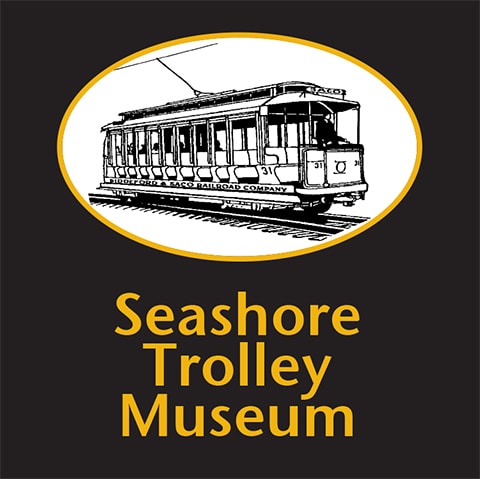
As a Seashore employee or volunteer, you are viewed by our members, donors, guests, community partners, and other supporters and outside parties as a representative of Seashore Trolley Museum. Whether or not you specifically reference or discuss your work, your participation on social media platforms is a reflection on Seashore Trolley Museum.
Since the term social media is used a number of different ways, we want to make sure you understand what we mean when we say social media. Social media is any tool or service that facilitates conversations over the internet. Social media applies not only to traditional big names, such as Facebook, Twitter, Google, and Instagram, but also applies to other platforms you may use that include user conversations, which you may not think of as social media. Platforms such as, YouTube, Flickr, Trip Advisor, blogs and wikis are all part of social media.
Finally, even though this policy is written so it’s easy to understand and conversational in tone, it’s an actual policy. If you don’t follow the principles laid out below when engaging in social media, you could face serious consequences up to termination of employment or removal from your volunteer position. Nobody wants that to happen though, so please read over this policy and make sure you understand it.
Seashore Trolley Museum has five social media principles that you should know before engaging in any type of online conversation that might impact the Museum. If you have any questions about these principles, this policy or social media in general, please email [email protected].
Be Nice, Have Fun, and Connect
Social media is a place to have conversations and build connections, whether you’re doing it for Seashore Trolley Museum or for yourself. The connections you’ll make on social media will be much more rewarding if you remember to have conversations rather than push agendas. Social media is another tool you can use to build our brand, just be sure you do it the right way.
Protect Information
Social media encourages you to share information and connect with people. When you use social media, you should try and build relationships, but you should also be aware that through your relationship with Seashore Trolley Museum, you have access to internal and/or confidential information that shouldn’t be made public. So, you shouldn’t share our internal or confidential Museum information or any of our members’, donors’ or other supporters’ personally identifiable information. If you mistakenly post internal or confidential information on a social media platform, it will be hard to take down that information completely.
Be Transparent and Disclose
When you talk about Seashore Trolley Museum on social media, you should disclose that you work or volunteer for the Museum. Your friends may know you work or volunteer for the Museum, but their network of friends and colleagues may not and you don’t want to accidentally mislead someone. The simplest way to disclose is to use the #Iwork4Seashore or #Ivolunteer4Seashore hashtag in any post that discusses Seashore Trolley Museum or your employment or involvement with Seashore Trolley Museum.
Follow the Law, Follow the Code of Conduct
Social media lets you communicate incredibly fast and have your message go viral in seconds. This makes it difficult to fix an inaccurate message once you’ve shared it. The best thing to do is double check all content before you share it, both for accuracy and to make sure it fits into the Museum’s overall social media strategy, our Code of Conduct, and any restrictions that may apply to your content based on the platform you are using (such as terms of service for the site upon which you are sharing). Seashore Trolley Museum employees and volunteers should hold ourselves to high ethical standards, as our Code of Conduct spells out, and that applies to social media just like everything else you do as an employee or volunteer of the Museum.
Be Responsible
Make sure you’re engaging in social media conversations the right way. If you aren’t an authority on a subject, send someone to the expert rather than responding yourself. Don’t speak on behalf of the Museum if you aren’t giving an official Museum response, and be sure your audience knows the difference. If you see something being shared related to Seashore Trolley Museum on a social media platform that shouldn’t be happening, immediately inform the Executive Director or page administrator. And always remember that anything posted in social media can go viral, no matter what your privacy settings may be, so be sure you’re only posting content you would feel comfortable showing up in your boss’ inbox, your coworker’s Twitter feed, or the front page of a major news site. You should avoid posting content that contains defamatory language. Everything you post online can be traced back to you, so be sure what you post is appropriate before you post it. Your post may be shared with others and archived even if you delete it later. Even if you put something in your bio about your content being just our own that may not stop someone else online from complaining about your activity and noting that you work or volunteer for Seashore Trolley Museum.
Social Media Account Ownership
This section isn’t a social media principle, but it’s still important enough to be in this policy. If you participate in social media activities as part of your paid or unpaid position at Seashore Trolley Museum on a public or private account created for Seashore Trolley Museum or to discuss Seashore Trolley Museum business, that account may be considered Seashore Trolley Museum property. If that account is Seashore property, you don’t get to take it with you if you leave the Museum— meaning you will not try to change the password or the account name or create a similar sounding account or assert any ownership of the contacts and connections you have gained through the account. This doesn’t apply to personal accounts, but would certainly apply to all Seashore-branded accounts. If you have any questions about an account you operate, please reach out to the Executive Director to discuss the account.
This policy was adopted by the New England Electric Railway Historical Society’s Board of Trustees on March 19, 2019.
